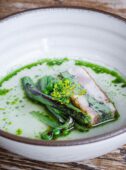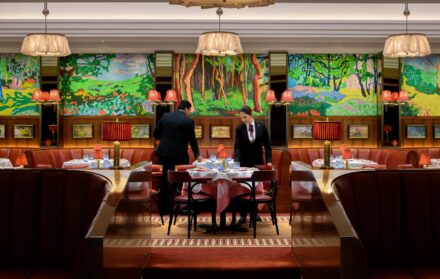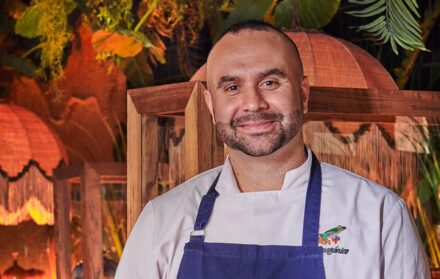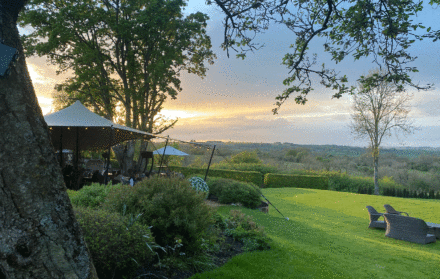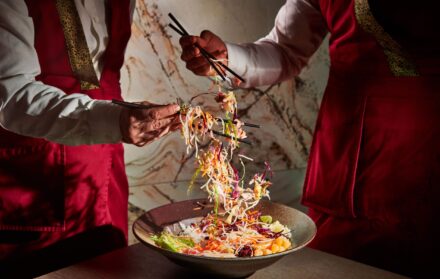
Tom Kerridge on lockdown, Liam Gallagher and the resilience of the restaurant industry
From the Thameside town of Marlow, Tom Kerridge became the first pub landlord in the world to score two Michelin stars for his cooking at The Hand & Flowers. As he marks the restaurant’s 15th anniversary
At the beginning of the year, Tom Kerridge was working on a four-part documentary for BBC2 that reflected on the mounting pressures felt by pubs across the country. Saving Britain’s Pubs was to be a Mary Portas-style series with the Michelin-starred chef offering his expertise to four boozers struggling to keep their heads above water. Then, the country went into lockdown and suddenly it became as much about saving his own pubs as it did about saving Britain’s.
“Right in the middle of filming this documentary, coronavirus hits,” Kerridge laughs, his cheery west country twang floating down the phone from his London restaurant. “It meant that 46,000 pubs up and down the country were shut, including my own. The documentary starts off with me trying to use my business know-how and get that reflected into other landlords and landladies’ viewpoints, to us all being in this together, trying to save our own businesses.”

He can laugh now; when we speak, it’s the beginning of October, a few weeks ahead of the government announcing the second lockdown and, along with many other restaurants across the UK, all five of his in London, Manchester and Marlow are back up and running. But it has been a testing year for the hospitality industry and not even the most prestigious of restaurants have been spared the hardship.
“It’s been a pretty mental six months, hasn’t it? Running a business has been painful. Every day seems to be presenting itself with another challenge and we just keep adapting and moving with it; that’s the only way to do it.”
And keep adapting Kerridge has. During the first lockdown, the Salisbury-born chef and his team set up a charity called Meals from Marlow, raising more than £180,000 and feeding more than 80,000 people from the Buckinghamshire town. Furloughed staff set to work in the kitchen, while locals poured in to volunteer their delivery services, sending food to frontline NHS workers, hospitals and local residents who were high risk. During October half-term week, the charity offered hot dinners to children eligible for free school meals, with Kerridge tweeting his frustration at the government’s decision not to extend the service beyond term time: ‘Did they really do that?’

“The hospitality industry is one of the most amazing, most brilliant industries,” he tells me. “Essentially what we want to do pretty much always is serve people and help people, and we found ourselves in a position where we had chefs, we could get hold of food, we had a unit where we could cook and we had frontline nurses who weren’t getting food, so we thought right, let’s do our bit.”
It’s the industry’s resilience that leaves him cautiously optimistic about its future in a post-pandemic world. “I think in the short-term it’s going to be very difficult. There will undoubtedly be some restaurant losses and some pub losses; there are going to be places that have closed down that will not be reopening. The costs and the pressures that they are under are huge,” he says. “But long-term, it’s one of the most exciting, diverse, eclectic, rich, amazing industries to be in and there will be entrepreneurial spirits that will see opportunity and flourish. We’re walking through a very smoky room at the minute, trying to find the exit, and until you do that it’s hard to see the positives. However, hospitality will always survive because as human beings we love that social connection; it just has to hold on very tightly until we get there.”
Holding on tightly is something Kerridge knows all about. The early days of The Hand & Flowers were trying. It was a dinner at Michael Bedford’s The Trouble House in Tetbury that inspired what is now arguably Britain’s most famous pub. Popping to the toilet between courses, Kerridge stopped to read a few framed press clippings on the wall, a paragraph about brewery-owned tenancies catching his eye.

The next day, while surfing the internet with his wife Beth, The Hand & Flowers, a Greene King pub, jumped out at him. Kerridge had decided it was the one he wanted to own before the couple had even visited. They told the bank they planned to extend their house, then used the loan to take over the tenancy of the pub instead.
They furnished the kitchen with appliances bought at auction; legless fridges were balanced on bricks wrapped in tin foil and the broken oven door was held shut with a 25-litre drum of vegetable oil. Kerridge tiled, hammered and nailed the space together, quickly learning the benefits of copper over ceramic pots after the shelves he had installed himself fell down and his set of Le Creuset smashed to pieces.
More important than aesthetics, though, was the food being served. Focusing on “flavour-driven cooking”, Kerridge took a Gary Rhodes-style approach (he was his sous in the late 1990s), simplifying dishes and allowing the ingredients to speak for themselves. His career up until that point had been focused on fine dining, and so he chose to flip the concept of traditional pub grub on its head.
Ever the optimist, he wrote a letter to the Michelin guide ahead of The Hand & Flowers launch, enclosing his CV and letting them know he was opening a restaurant pub. They responded by showing up three weeks later. Within 10 months of opening, The Hand & Flowers was awarded its first star, and five years down the line it won its second — the first and only pub in the world to do so. It was game-changing, not just for Kerridge but for the entire industry.

“I think the way the pub movement and the pub scene has grown — to being reflective of great food, but in an environment that still feels more comfortable and more accessible to the wider public — has allowed people to feel like they can go and eat Michelinstarred food but in a space that they enjoy,” says Kerridge. “That, in turn, has led to restaurants becoming much more laid-back and making them more accessible. Michelin has never ever claimed that Michelinstarred restaurants have to have 11 types of petit fours and tablecloths; they’ve always been about the food, and I do think the pub scene has been very prominent in altering people’s attitude to what the Michelin guide is all about.”
Following The Hand & Flowers, Kerridge has opened The Coach Inn (which won its Michelin star in 2018) and The Butcher’s Tap in Buckinghamshire, Kerridge’s Bar and Grill in Corinthia London, and The Bull & Bear in Manchester. There has also been a stream of TV shows and books charting his weight loss journey (he famously dropped 12 stone in two-and-a-half years) and offering easy, DIY pub grub to make at home.
What has been missing from many a foodie’s bookshelf, however, is a tribute to The Hand & Flowers. This November, the restaurant’s journey from start-up to stardom is chartered in a new cookbook, a celebration of the pub’s 15-years in business. Penned for a summer release but pushed back due to the pandemic, the tome presents 70 of the restaurant’s best dishes, such as smoked haddock omelette, roast hog with salt-baked potatoes, and chocolate and ale cake.
“One of the most beautiful things about [the cookbook] is revisiting some of these recipes and recognising that many of them would still be able to stand the test of time and be served in The Hand & Flowers right now,” says Kerridge. “A lot has changed in terms of the way we build the dishes and create the food, but the heart, soul and DNA is still exactly the same as when we first opened. From first opening to now has just been a phenomenal journey but it’s still about connecting and resonating with people.”

Among those people is Liam Gallagher. In place of a foreword in the book is a photo of the musician with Kerridge, alongside a glowing Twitter review of his trip to the Marlow restaurant. For the chef, who is a lifelong Oasis fan (he chose the band as his specialist subject on Celebrity Mastermind, and won), it was the perfect way to open the book. “I could have got a really major chef to write something, or a food journalist to write something clever about pubs and their place in society, but actually the most beautiful thing about The Hand & Flowers is it’s always been somewhere where everybody is welcome, no matter where you’re from,” he explains.
“You don’t have to be a foodie, you don’t have to read food articles and you don’t have to go to a farmers’ market; you just turn up and have steak and chips. For me it was very important to try and find a foreword that was connecting or reflective of people.”
A potty-mouthed rockstar isn’t the first thing that comes to mind when you think of a Michelin-starred restaurant — or, indeed, a cookbook — but that is why it is so perfect. Kerridge has never been about pomp and circumstance, and this is surely why The Hand & Flowers has seen such success. Fifteen years later, good food, good atmosphere and a cheery pub landlord is still working its magic in Marlow. As Gallagher put it best: ‘Hand and Flowers, Marlow. Food of the Gods. Tom Kerridge fantastic chap.’
The Hand & Flowers Cookbook by Tom Kerridge is out now, Bloomsbury, £40; Saving Britain’s Pubs with Tom Kerridge starts on BBC2 on 12 November at 8pm
